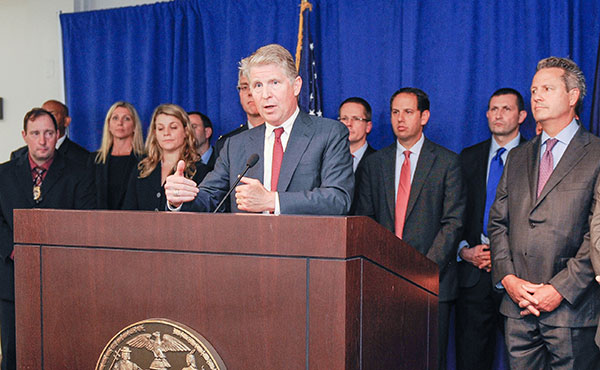
Manhattan DA Cy Vance (photo: DA's office)
Sex trafficking is a lucrative criminal enterprise in which youthful looks are in high demand and actual children command top dollar. Yet, gaps in New York State's sex trafficking laws limit prosecutors' ability to convict traffickers of high-level felonies, making sex trafficking of children in New York a relatively low-risk proposition.
Forty-six states in this country recognize that prostituted children are victims of sex trafficking. These states acknowledge that vulnerable children innately deserve the strongest protection, and their laws enable prosecutors to seek tougher convictions and prison sentences for those who traffic minors. Currently, New York is not one of those states.
Traffickers are not merely common criminals, but often calculating heads of criminal enterprises that rake in thousands of dollars over the course of months – or even years – before their rings are dismantled. They know that Sex Trafficking is often difficult to prove, given the unwillingness of victims to testify against their abusers due to the trauma they have suffered, fear of retribution, and the complex psychological bonds many have developed.
In New York State, Sex Trafficking convictions require proof of force, fraud, or coercion, even if the victim is under 18. According to data compiled by the Polaris Project, New York is one of only four states where that is the case. That means, for instance, if New Jersey prosecutors prove that a defendant sold a sixteen-year-old girl for sex, that defendant would be convicted of Sex Trafficking – but in New York, prosecutors would additionally have to prove that the defendant used fear, fraud, or coercion to compel that teenager into trafficking. New York's laws are similarly weaker than the federal and international definitions of sex trafficking. That must change.
As national Human Trafficking Prevention Month draws to a close, I am calling on New York State legislators to give our prosecutors the same tools, allowing us to better protect the children traffickers target for sexual exploitation and profit. The penal code must be changed to recognize the fact that children do not have the legal, psychological, or emotional capacity to consent to sexual activity, as reflected in our statutory rape laws. This view of children should not change simply because there is an exchange of money.
Of course, New York takes trafficking very seriously. Recently announced state legislative initiatives include many significant proposals, such as changing Sex Trafficking from a nonviolent to a violent felony, and offering more support and services for victims. But there is a gaping hole in our State's laws governing the trafficking of children – one that would be simple to correct. We need to amend our penal code so that Sex Trafficking can be proved without evidence of force, fraud, or coercion when the victim is less than 18 years of age.
Law enforcement in jurisdictions that have this proposed statute, such as New Jersey and our counterparts in the Southern District of New York, are better able to secure high-level felony convictions and correspondingly lengthy sentences of traffickers. In contrast, New York State prosecutors have occasionally found that the only way we can bring a trafficker to justice is to seek prosecution in another jurisdiction.
Let me give you an example. Royce Corley, who also went by the name "Ron Iron," ran a prostitution ring in Manhattan in 2011 and 2012 that included underage girls. He photographed the children – including three 16-year-olds – in explicit poses, advertised them on backpage.com, and made thousands of dollars by selling them for sexual services. Working with our partners in the NYPD, Corley was arrested after an undercover sting.
Despite the fact that Corley was prostituting children, my office's Human Trafficking prosecutors were unable to charge the defendant with Sex Trafficking under current New York State law. So, we asked the Southern District of New York to take the case, and to seek appropriate justice where we could not. Following his trial conviction under Federal sex trafficking statutes, Corley was sentenced to 10 years in prison and 10 years of post-release supervision.
Prosecutors should not have to hand-off cases to ensure that victims in New York get justice. My proposal would not only ensure that offenders could be convicted of higher felonies and therefore receive stronger sentences, but would also ease the traumatic experience a victim may face if a case goes to trial.
Eliciting testimony about sexual conduct and force, fraud, or coercion is incredibly difficult for any victim, let alone a child. With the proposed changes, a child's testimony could essentially be boiled down to two questions: How old are you? And, were you prostituted by the defendant on trial?
At its core, this proposal is an acknowledgement that a child sold for sex is a victim, plain and simple. Let's follow in the footsteps of the overwhelming majority of other states, the federal government, and the international community. Let's ensure that those who profit from selling children will face consequences commensurate with their crimes. Let's do what is just for the most vulnerable among us.
***
Cyrus R. Vance, Jr. is the Manhattan District Attorney.
***
Have an op-ed idea or submission for Gotham Gazette? E-mail editor Ben Max: This email address is being protected from spambots. You need JavaScript enabled to view it.




